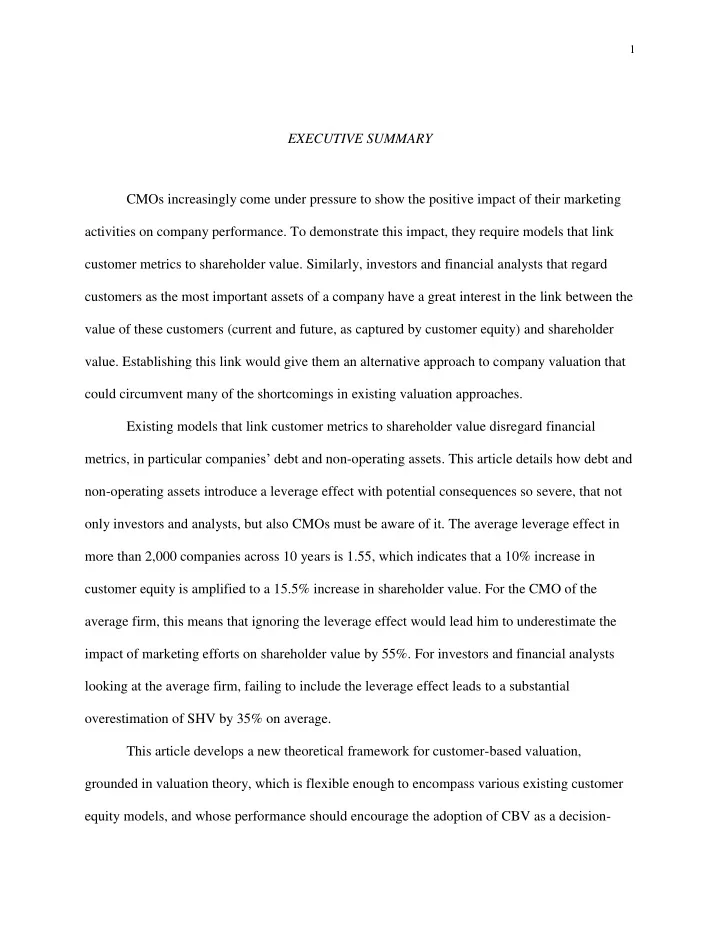

1 EXECUTIVE SUMMARY CMOs increasingly come under pressure to show the positive impact of their marketing activities on company performance. To demonstrate this impact, they require models that link customer metrics to shareholder value. Similarly, investors and financial analysts that regard customers as the most important assets of a company have a great interest in the link between the value of these customers (current and future, as captured by customer equity) and shareholder value. Establishing this link would give them an alternative approach to company valuation that could circumvent many of the shortcomings in existing valuation approaches. Existing models that link customer metrics to shareholder value disregard financial metrics, in particular compan ies’ debt and non-operating assets. This article details how debt and non-operating assets introduce a leverage effect with potential consequences so severe, that not only investors and analysts, but also CMOs must be aware of it. The average leverage effect in more than 2,000 companies across 10 years is 1.55, which indicates that a 10% increase in customer equity is amplified to a 15.5% increase in shareholder value. For the CMO of the average firm, this means that ignoring the leverage effect would lead him to underestimate the impact of marketing efforts on shareholder value by 55%. For investors and financial analysts looking at the average firm, failing to include the leverage effect leads to a substantial overestimation of SHV by 35% on average. This article develops a new theoretical framework for customer-based valuation, grounded in valuation theory, which is flexible enough to encompass various existing customer equity models, and whose performance should encourage the adoption of CBV as a decision-
2 making tool in the financial community. Moreover, this article applies this framework for customer-based valuation to two companies in the media and telecommunications industry (Netflix and Verizon) over six years to analyze the influence of customer and financial metrics on SHV. The results show that it predicts market capitalization well and that longer time horizons seem more appropriate for calculating customer lifetime value or customer. The findings also challenge previous notions about the dominant effect of the retention rate and underline the importance of predicting the number of future acquired customers for a company. For companies whose value is largely driven by customers, information about their customer management activities and the corresponding customer metrics are material. We advise such companies to disclose their customer metrics to ensure their adherence to existing legal requirements and reduce information asymmetry. BIOGRAPHY Christian Schulze is Assistant Professor of Marketing at the Frankfurt School of Finance & Management. He holds a doctoral degree from Goethe University Frankfurt and has been a visiting researcher at the University of Texas in Austin. His research interests include online marketing, customer value management and the marketing-finance interface. He has several years of work experience with The Boston Consulting Group, and has advised numerous firms in the financial services sector on marketing and sales topics.
3 Bernd Skiera is a Chaired Professor of Electronic Commerce at the department of marketing at the Faculty of Business and Economics at Goethe University Frankfurt, Germany, and a member of the board of the E-Finance Lab at the House of Finance at University of Frankfurt. His research areas are customer management, pricing, electronic commerce, and online marketing, with a particular focus on the financial service industry. He was a finalist for the Journal of Marketing’s 2008 MSI/H. Paul Root Award with the paper “Customer Equity: An Integral Part of Financi al Reporting.” His work has been published in, among others, Journal of Marketing, Journal of Marketing Research, Management Science, Marketing Science, Journal of Management Information Systems, Journal of Product Innovation Management, Journal of Service Research, and European Journal of Operational Research. Thorsten Wiesel is an Assistant Professor at the Marketing Department, University of Groningen (The Netherlands). He finished his Ph.D. at the Goethe University in Frankfurt (Germany). During his PhD, Thorsten has been a visiting scholar at IESE Business School, Barcelona (Spain), Penn State University, State College (USA), and Goizueta Business School, Atlanta (USA). In 2004, Thorsten was named “ISBM Business Marketing Doctoral Fellow” and at EMAC 2 006, the ‘Best Paper of the Conference based on a Doctoral Dissertation’ was awarded to Thorsten and his co-authors. His areas of expertise and interest are in customer management, marketing performance measurement, and the marketing-finance link. Thorsten has published in various academic outlets such as Journal of Marketing, Marketing Science, Journal of Service Research, and Journal of Interactive Marketing and has been finalist of the 2008 MSI/H. Paul Root Award as well as the 2010 INFORMS Marketing Science Practice Prize.
Recommend
More recommend